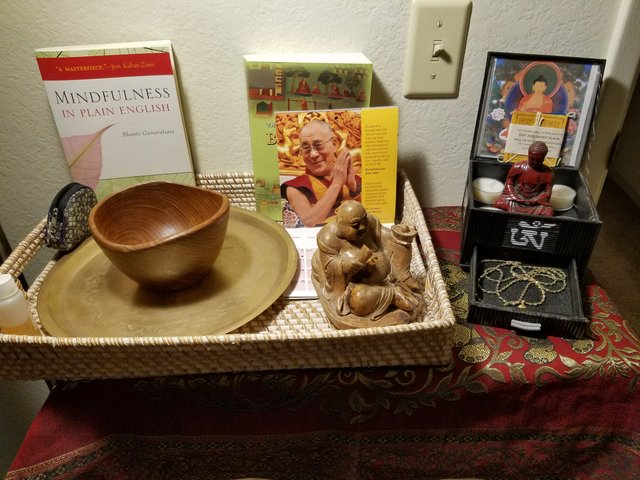Meditation: The LAMRIM Version (Part 2)
"What we think, we become." -Buddha
The following explain the practice of meditation as described in the Lamrim texts. It is broken up into into three sections: pre-meditation, the actual meditation and post-meditation. This should be taken as an advance guide and it is NOT required to follow these steps to start meditating.
I have included a set of simple step of instructions as well. Check out the full article here: Staying Calm: Meditation by @nicnas
Read Meditation: The LAMRIM Version (Part 1)

Lamrim Guide:
Meditation
The idea of Meditation based on the Lamrim is a study of ones mind. It is called an analytical meditation. This process involves the examining support for virtue (morals) as well as the examination of how to defeat our non-virtue. The basis is to examine these from any and all points. To completely breakdown the idea to have a clear understanding of its nature.
This analytical practice really isn't anything new to us. Anytime we have emotions, anger for example, we contemplate the reasons for this. Try to think about the last time you got very angry or upset. In that couple seconds what did you did? Create more reasons to be angry? Justify it? We connect the first justification with the next and so on and so forth until we act on this emotion. This is ultimately the same analytical approach just not in the correct manner or state of mind.
Considering this we should use an idea in Buddhism of Single-Pointedness of the mind. This is just a an idea of concentrating completely on one thing. This allows us to calm our mind and not get distracted. Or that is the goal anyways. The teachings say that one should work on a single subject until they have gained a great understand of it. It is also said that one should keep the subject on ones mind throughout the day and reflect on it.
There are numerous subjects that should be realized. This could take many lifetimes. Ultimately its possible to reach a state of nirvana or enlightenment from this. But one must realize emptiness prior to this being possible. Emptiness is a deep subject and I wont go into detail here. Maybe you could research this one your self?
So in a single meditation we should try to combine that of the analytical meditation and that of Single-Pointedness of the mind.
Two Types of Analytical Meditation (Among Many):
- Objective - Subjects of Selflessness, Subtle Impermanence or the Four Noble Truths View Four Noble Truths Post Here by @voghera.
- Subjective - Subjects of Compassion, Faith or Compassion.
Post-Meditation:
There is a lot more to this practice than just the time in the meditation. The subject matter of the meditation should be included in prior steps to the practice as well as post meditation. It takes a lot of discipline to accomplish this. There are a lot of benefits of wholeheartedly working on this everyday.
If after meditation we have are still pondering the subject at hand, if the effect lingers, we are grasping the idea of how to grow. Our meditation is improving.
The post-meditation time involves a lot of mindfulness. View my post here: Staying Calm: Mindfulness by @nicnas. Not only that we should continually remember the thoughts that grown from the sitting(meditation). We can do this all day long to maintain the taste of our practice.
The mental function of introspection should be like a sentry, watching with vigilance. And the mental function of mindfulness should be like a guard, ensuring that our thoughts and actions accord with the spirits of our meditation practice, and that we do not come under the influence of the delusions." Yangsi Rinpoche on the subject of meditation and the Lamrim.

Simple Steps:
These steps are just a simple guide. There is so much knowledge out there and mediation takes so may forms. I am trying to give you a reasonable start point to try it out. See how you feel after and hopefully you will include meditation in your daily routine.
Focus/Breathing Mediation:
Find a comfortable place to sit. You can cross your legs on the floor, with a pillow, with your legs parallel or even in a chair. The key is that you are comfortable and that you keep your back straight.
Make sure it will be quiet. Use headphone or something to lessen distractions. (After some practice these distractions can become part of the process.)
Close your eyes and relax. Breath normally. Your breath will naturally slow down as you relax
Breath IN deeply and then OUT deeply. After each iteration count in your head.
(Breath in and out then "1," breath in and out then "2.")
Do this all the way until you reach 10 and start over at 1 again.You can set up an alarm if you want but just try to sit for at least 5 minutes the first time. As you start mediation, minutes are going to seem like hours. This will improve. Just focus on your breath and the count. If you loose your count, start over.
Gradually as you become more comfortable mediating, add more time. I started with 5 minutes and then I was able to sit for an hour or more. The benefits are well worth the time and effort. TRUST ME.

More teachings coming soon to a SteemIt theater near you...

Please Support my efforts by upvoting and following.
NAMASTE ( BOW ) and Thank you for reading, @nicnas

Someone asked me in a comment to post an image of my altar. Don't laugh. Here it is:

And here is my friend that keeps me company in my living room. He is like 4' tall.

Excellent lesson to benefit the whole mankind using meditation. In Sikhism very close, we focus on sound while meditation. This included two senses "toungue" and "Ears" as long as tongue is uttering and ears are listening meditation goes on. Once tongue is uttering but ears are not listening, you lost the mindfulness and went somewhere else. You bring the mind back to listening "politely". We use the word "WaheGuru". Wahe - while breath in (inhale) - Listen....Guru-breath out (exhale)... Listen. We split because after Wahe (pause) to make sure ears listened to it then Guru (pause) to make sure ears listened to it.
WaheGuru is the "Word" (we believe) is the original sound when the whole Creation begun and it helps to concentrate. Buddhism & Sikhism share very close principals as I know!
Very cool. That is very similar to chanting or Vibrations (OM) meditations
Yes, @nicnas (OM) is the sacred word in India from thousands of years.
Great piece man, i like your altar and also your friend, thanks for mentioning my post
Of Course. It just make sense to link to steemit friends post instead of outside articles.
I love lamrim, who is your teacher?
I don't have one in which i practice daily, my mentors are a Vietnamese Buddhist monk friend of mine and another teacher who has guided me for a long time. What about you?
It's nice to know you have mitratā (spiritual good friends), they are a very important part of the path. My first teacher back in the early 90s is a Korean Monk, I called him Sunim, which means monk. His Buddhist name was Dharma light or something like that. He taught me the 4 noble truths, eightfold path, dependent origination, prajnaparamitta, real compassion and gave me my Bodhisattva vows. Sunim also sent me to SN Goenkas vipassana centers to teach me equanimity and insight into reality as it is...my Tibetan teachers are, which I haven't visited with them since 2010 but I studied with them from 2003 thru 2010..Younge Khachab Rinpoche VII https://www.youngedrodulling.org
Namkhai Norbu
http://tsegyalgar.org
Khenpo Sonam Rinpoche
http://www.riwoche.com/SonamRinpoche.html
Each one of my teachers are very kind, won't let me run over them, and very well educated. I miss them all very much. Soon with my steem account doing so well, I'll have money to travel and visit with them.
Thank you for sharing. It is amazing to connect to steemit to our core beliefs. If you can use earnings from here to reconnect with your teachers then you are doing everything right.
As Buddha rightly said, our thoughts define us. It defines who we are and what we want to become. Meditation is a mental state. It helps you to fight against unwanted thoughts in your head. People often ignore the benefits of it.
You have mentioned in your simple steps
I know how important Meditation is for each of us. I have been practicing over a year and I can certainly advocate for it- "How important is it."
@nicnas, it commendable that you are spreading these wise approach here in Steemit community. Keeping doing what you do best.
Best comment Ever!!! Thank you for the knowledge. You are definitely right about how important it is. I hope to keep spreading this knowledge because i think a lot of people would benefit. There are a decent amount of people here who appreciate it and hopefully that grows. Ill be happy when everyone that is part of this community is meditating and being mindful.
Top notch stuff
i really appreciate that.